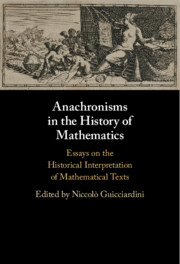 Anachronisms in the History of Mathematics
Anachronisms in the History of Mathematics Book contents
- Frontmatter
- Contents
- Contributors
- Figures
- Preface
- 1 Introduction: The historical interpretation of mathematical texts and the problem of anachronism
- 2 From reading rules to reading algorithms: textual anachronisms in the history of mathematics and their effects on interpretation
- 3 Anachronism and anachorism in the study of mathematics in India
- 4 On the need to re-examine the relationship between the mathematical sciences and philosophy in Greek antiquity
- 5 Productive anachronism: on mathematical reconstruction as a historiographical method
- 6 Anachronism in the Renaissance historiography of mathematics
- 7 Deceptive familiarity: differential equations in Leibniz and the Leibnizian school (1689–1736)
- 8 Euler and analysis: case studies and historiographical perspectives
- 9 Measuring past geometers: a history of non-metric projective anachronism
- 10 Anachronism: Bonola and non-Euclidean geometry
- 11 Anachronism and incommensurability:words, concepts, contexts, and intentions
- Index
3 - Anachronism and anachorism in the study of mathematics in India
Published online by Cambridge University Press: 19 July 2021
- Frontmatter
- Contents
- Contributors
- Figures
- Preface
- 1 Introduction: The historical interpretation of mathematical texts and the problem of anachronism
- 2 From reading rules to reading algorithms: textual anachronisms in the history of mathematics and their effects on interpretation
- 3 Anachronism and anachorism in the study of mathematics in India
- 4 On the need to re-examine the relationship between the mathematical sciences and philosophy in Greek antiquity
- 5 Productive anachronism: on mathematical reconstruction as a historiographical method
- 6 Anachronism in the Renaissance historiography of mathematics
- 7 Deceptive familiarity: differential equations in Leibniz and the Leibnizian school (1689–1736)
- 8 Euler and analysis: case studies and historiographical perspectives
- 9 Measuring past geometers: a history of non-metric projective anachronism
- 10 Anachronism: Bonola and non-Euclidean geometry
- 11 Anachronism and incommensurability:words, concepts, contexts, and intentions
- Index
Summary
The foremost historiographic challenge in interpreting pre-modern Indian mathematics is arguably not anachronism so much as anachorism, the blurring of geographical or cultural rather than chronological distinctions. For example, historians struggle constantly with ways to avoid or explain calling Indian analyses of right-triangle relations “Pythagorean”, or using the term “Diophantine equations” for the type of problems designated in Sanskrit as \kuttaka\ or \varga-\prakrti. Nonetheless, the combination of anachronism and anachorism provides the study of Indian mathematics with a powerful lens, which clarifies even as it distorts. This paper will address such trade-offs between popular misconceptions and deeper insights, especially in the application of concepts from the historiography of early modern European calculus to infinitesimal methods used in Sanskrit mathematics of the early to mid-second millennium.
- Type
- Chapter
- Information
- Anachronisms in the History of MathematicsEssays on the Historical Interpretation of Mathematical Texts, pp. 83 - 104Publisher: Cambridge University PressPrint publication year: 2021
- 1
- Cited by


